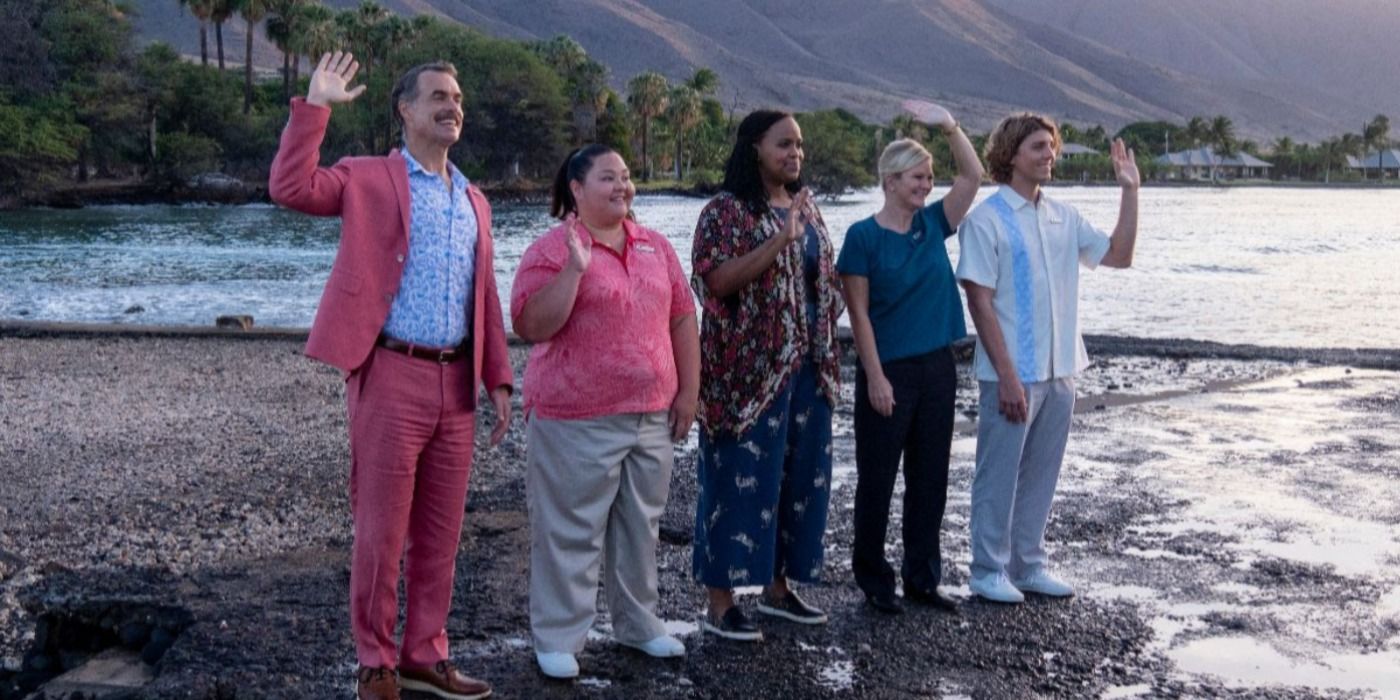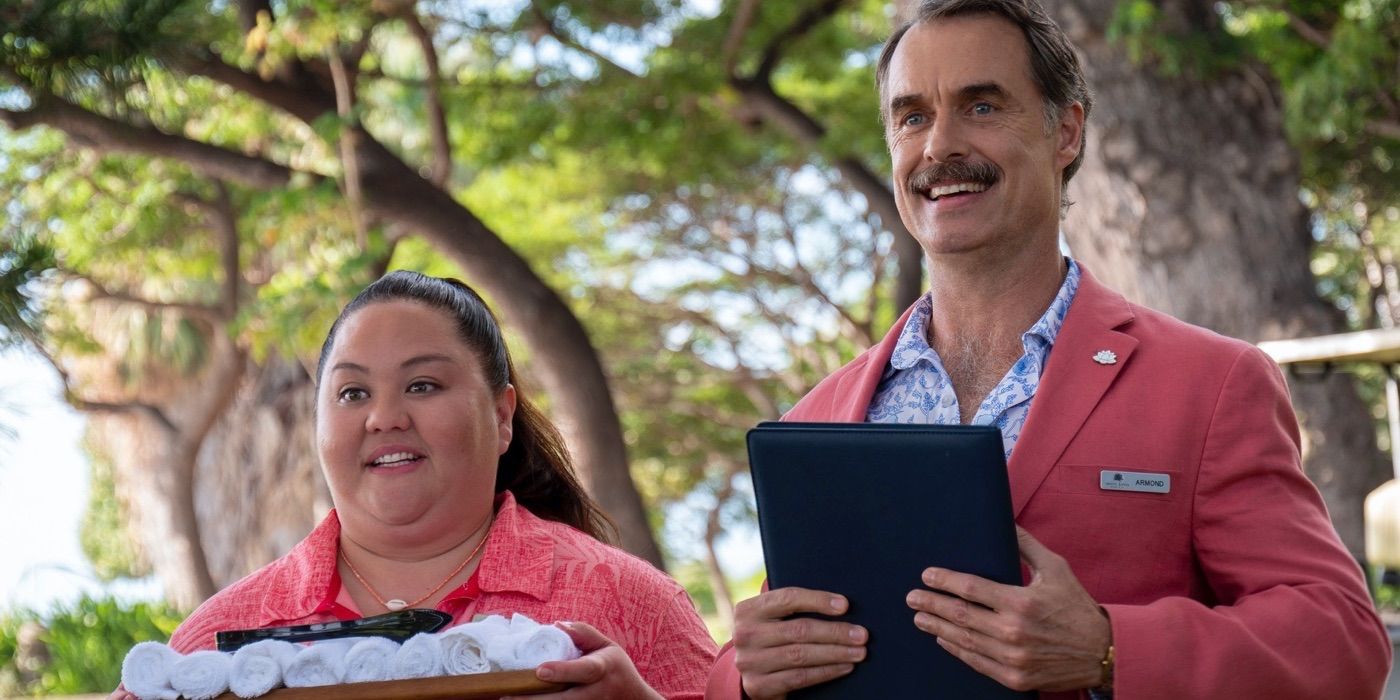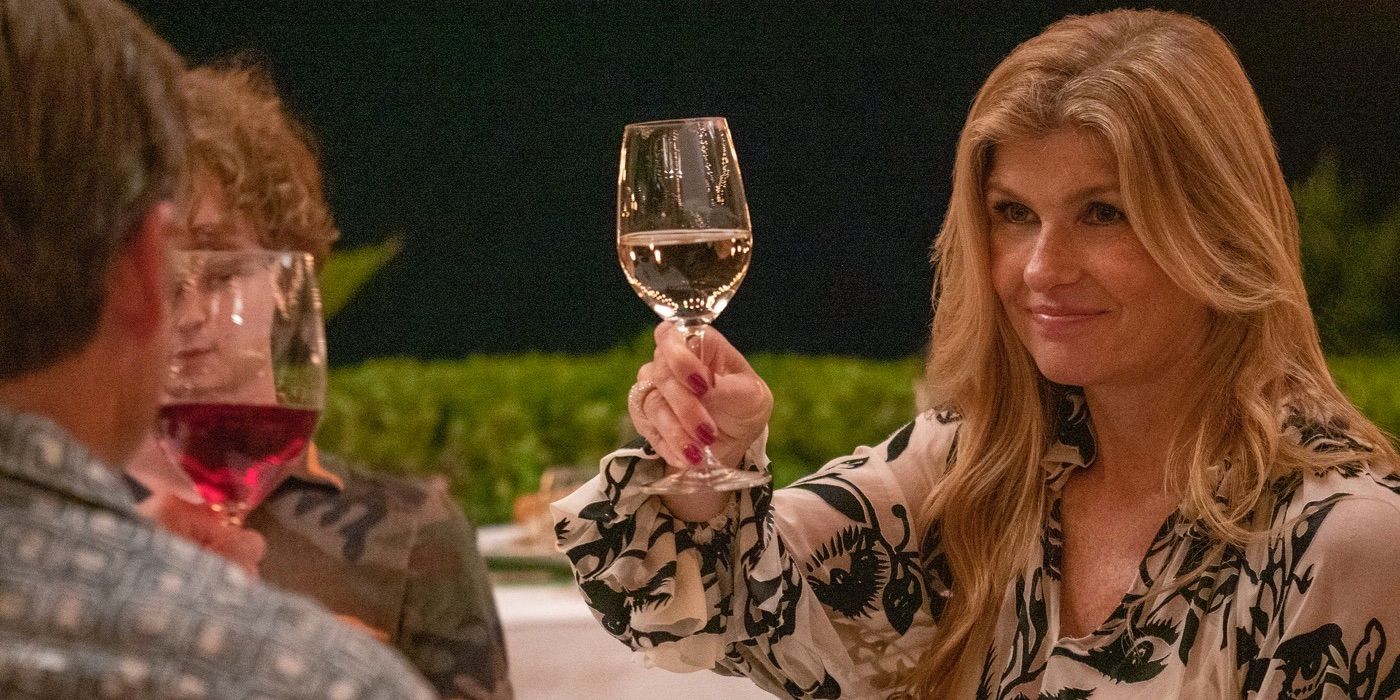“Travel changes you,” Anthony Bourdain once said. “As you move through this life and this world you change things slightly, you leave marks behind, however small.” In The White Lotus, from Enlightened creator Mike White, HBO’s newest miniseries shows just how deep those marks can go. But, as the guests at The White Lotus resort in Hawaii meet the resort staff, manager Armond (a phenomenal Murray Bartlett) points out that the employees need to be vague and generic, but that the guests “just need to feel seen.” White's welcome return to HBO is a smart commentary on economic and gender inequality — from the very beginning, the show sets itself up as a story about the wealthy who need attention and the employees who must smile and nod at their newest visitor’s whims — while also being one of the strangest and most hilarious shows to debut this year.
Set at the title resort over the course of a week, The White Lotus follows a group of rich vacationers and the staff who will attempt to give their visitors a trip they won’t forget. Amongst those staying for the week are the snobby Shane (Jake Lacy) and his newlywed wife Rachel (Alexandra Daddario); tech CEO Nicole Mossbacher (Connie Britton) and her husband Mark (Steve Zahn), who have brought along their tech-obsessed son Quinn (Fred Hechinger), their vicious daughter Olivia (Sydney Sweeney), and her best friend Paula (Brittany O’Grady); and Tanya (Jennifer Coolidge), who has come to scatter her mother’s ashes.
White, who has written and directed all six episodes, makes each of these groupings interesting in their own bubbles, yet makes these dynamics even more fascinating once they start intermingling with each other and the hotel staff. Tanya heads to the resort’s spa to relieve some tension, where she befriends masseuse Belinda (Natasha Rothwell) and motivates her new friend to start her own business with Tanya’s help. Shane begins his own rivalry with Armond over his room, while Rachel simply wants her new husband to let things go. Meanwhile, the Mossbacher family has several awkward encounters with another guest, a bag of drugs is lost, a vacation fling causes immediate jealousy, and lost characters find their own sense of purpose.
White has made each of these characters inherently interesting, so when they start to intersect and clash with each other, pretty much any combination of these personalities is compelling. Yet adding to the inherent tension and awkwardness is the series’ flash-forward opening, which shows Shane alone at an airport after his stay at the resort, as a couple questions him about the person who died at The White Lotus in the past week. It’s not entirely necessary to the overall story to include this scene right off the top, yet it does add a level of anxiety over the run of the miniseries. During these six episodes, White gives the audience enough reason to believe that any of these people could be the victim — or possibly the cause of this unknown person’s death.
While many of these stories end in a way that could have been predicted from the first episode, White’s writing and the performances make the journey through this miniseries worth it. Coolidge, Daddario, and Zahn in particular are standouts, giving some of the most nuanced and surprising performances of their careers, and the entire cast is packed with characters full of self-absorption, self-righteous fighting for others, and a complete lack of self-awareness. Though most of these guests are mostly ignorant about their actions, Daddario’s Rachel spends her vacation trying to figure out the next step in her life, even while her new husband won’t stop complaining about the accommodations. Having married into her newfound wealth, Rachel is one of the few guests that can see both sides of this guest-employee dynamic. Even when Rachel isn’t vocal about her objections, Daddario is giving the audience her character’s entire feelings just through her performance — primarily her eyes, which speak volumes.
The staff of The White Lotus also isn’t without their share of problems, but these characters are also more than just what they present to the guests, which might explain why they also feel more layered. Bartlett and Rothwell end up the true stars of The White Lotus because of this, as we see both of them in one of the most frustrating weeks of their careers. Rothwell has a cautious optimism to her character, as she puts maybe too much trust in her newfound bond with Tanya. But it’s Bartlett who is extremely dynamic and steals every scene he’s in. As Armond, Bartlett’s ability to shift his attitude from one guest to the next is amusing and honest, a character who is so clearly sick of the resort’s visitors, yet still — up to a point — wants to give these people a good time. Bartlett is trying his best to absorb the pressure of his job and the picky guests, but it’s clear from very early on that he’s had almost too much of this job already. The White Lotus is full of excellent performances from actors the audience already likely knows and loves, but after years of great work, this is a star-making performance by Bartlett.
But the larger focus of White’s miniseries is that dynamic between the rich and those who can’t afford to go spend a week on a Hawaii vacation. Even when the guests show an altruistic attitude towards their hosts, it’s clear that their actions and empty kindness will end up hurting these people more than help. Frequently around the Mossbacher table, the family discusses the hypocrisies of people with wealth, yet those speaking never have the perception that they’re the biggest hypocrites of all. It’s the obliviousness of these characters that White taps into with great effect. At one point late in the series, one of the guests confides all their problems that we’ve seen over the show to one of the employees, who reacts as if they can’t believe these are the issues the rich are having. Even if White doesn’t belittle the problems of the guests, it becomes clear that these issues with money and slightly better rooms and privilege are the kind of complaints the employees of The White Lotus wish they could have.
White’s past work makes him the perfect person to tell this story, as he knows how to write melodrama, having created the soap opera Pasadena and written for Dawson’s Creek; he’s also written smart ensemble stories like School of Rock and Beatriz at Dinner, and he knows how to utilize uncomfortable moments in stories that blend comedy and drama into something new, thanks to his work on Freaks and Geeks and Enlightened. Between White’s twisty and intertwining story and his assured directing, eight years after the conclusion of Enlightened, White has returned to HBO with a miniseries that certainly feels in touch with his strengths.
However, The White Lotus does occasionally lose the thread on some of its stories. A character who seems integral to this story in the first episode disappears and is only quickly mentioned one other time. Interactions between Shane, Rachel, and members of the Mossbacher family are fun in the moment, but don’t end up serving any larger purpose by the end of the series, and Nicole especially is a cog in the stories going on around her rather than a fully fleshed-out character. But again, it’s still a joy to see this odyssey that White has crafted play itself out, even if not every decision leads to something essential to the story.
The White Lotus is a surprising, peculiar, and yet extremely prescient miniseries with a hauntingly beautiful score by Cristobal Tapia de Veer and a tremendous ensemble. In the last few years, HBO has become the home to several unconventional miniseries, but The White Lotus is one of the funniest, most addictive, and most unusual miniseries to come out from HBO in quite some time. The White Lotus doesn’t just herald White’s welcome return to HBO, it’s also the perfect hysterically bizarre summer series to get lost in.
Grade: A-
The White Lotus airs Sundays at 9 PM on HBO, streaming afterward on HBO Max.



